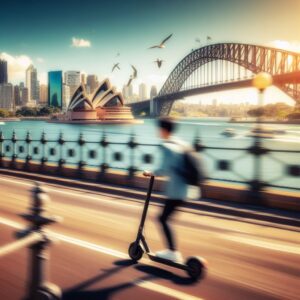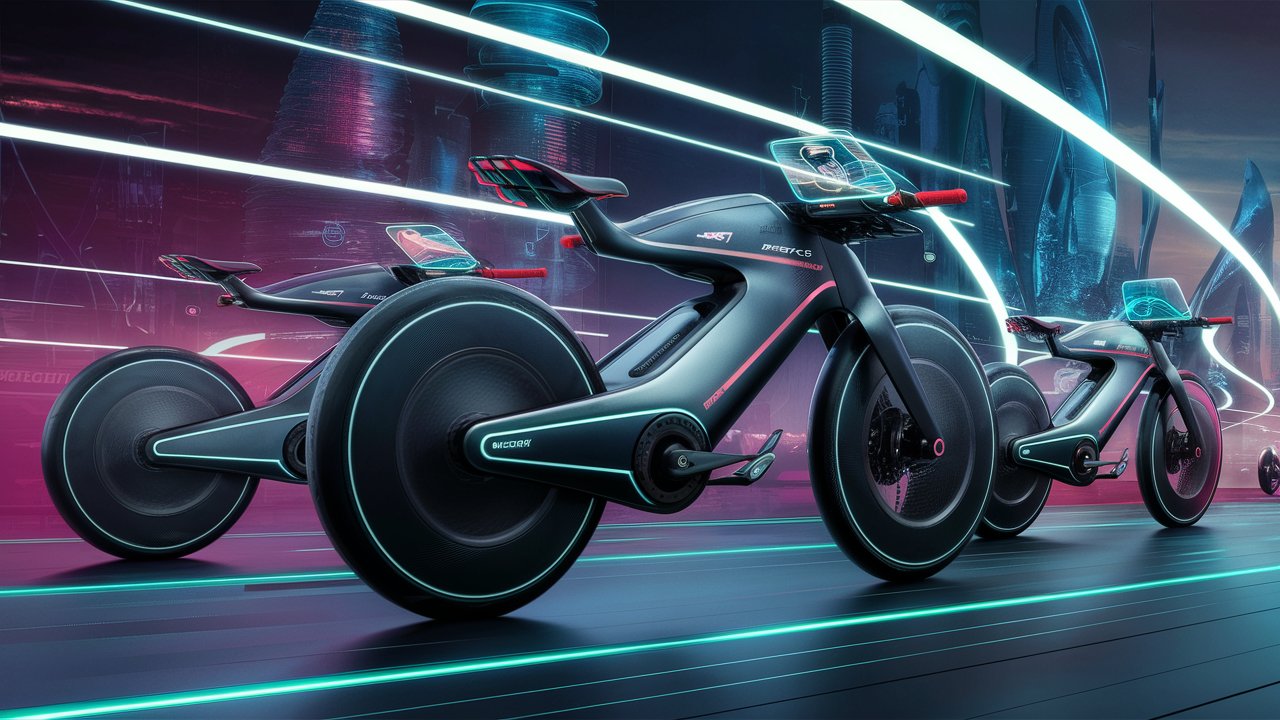
Are Electric Scooters Legal in NSW?
Electric scooters are currently illegal to ride on public roads and footpaths in NSW with exceptions. The Trials in Wollongong, Armidale, and Lake Macquarie. Electric scooters are a great way to get around the city, but are they legal in New South Wales? The answer is not so simple. In this article, we will explain the current laws and regulations regarding electric scooters in NSW, and what you need to know before you hop on one.
What is an electric scooter?
An electric scooter is a two-wheeled vehicle that runs on an electric motor and a battery. Unlike electric bikes, electric scooters do not have pedals and rely solely on the motor for propulsion. Electric scooters can vary in size, speed, range, and design. Some of them are foldable and portable, while others are more sturdy and powerful.
Electric scooters can be used for various purposes, such as commuting, recreation, tourism, or delivery. They can also be rented through apps or shared services that allow users to locate, unlock, and pay for them using their smartphones.
What are the benefits of electric scooters?
Electric scooters have many advantages over other forms of transportation, such as:
- Sustainability: Electric scooters have zero tailpipe emissions and use less energy than cars or motorcycles. They can also reduce traffic congestion and parking problems, which can lower greenhouse gas emissions and air pollution.
- Convenience: Electric scooters are easy to use and operate. They can be folded and carried around, or stored in small spaces. They can also access places that cars or bikes cannot, such as narrow streets, bike lanes, or footpaths.
- Affordability: Electric scooters are cheaper than cars or motorcycles in terms of purchase, maintenance, and fuel costs. They can also save money on public transport fares or parking fees.
- Fun: Electric scooters are fun and enjoyable to ride. They can provide a sense of freedom, adventure, and excitement.
What are the challenges of electric scooters?
Electric scooters also face some challenges and limitations, such as:
- Safety: Electric scooters can pose safety risks for both riders and pedestrians. Riders can fall off or crash into obstacles or other vehicles. Pedestrians can be hit or tripped by electric scooters. Electric scooters can also malfunction or catch fire due to faulty batteries or wiring.
- Legality: Electric scooters are not legal in all places or situations. Different states and territories have different laws and regulations regarding electric scooters. Riders can be fined or charged for violating these laws or regulations.
- Sustainability: Electric scooters are not completely sustainable or eco-friendly. They still require electricity to charge their batteries, which may come from fossil fuels or other non-renewable sources. They also generate waste and pollution when they are disposed of or recycled.
What are the laws and regulations regarding electric scooters in NSW?
In New South Wales, the Road Transport Act defines a “vehicle” as being any description of vehicle on wheels. It goes on to define a “motor vehicle” as being “a vehicle that is built to be propelled by a motor that forms part of the vehicle” and a motorcycle as being a “motor vehicle with two wheels”. While there are exceptions for some power assisted / motorised bicycles these exceptions do not apply to electric scooters. This is because a motorised bicycle uses a motor to assist the rider. Electric scooters do not have pedals and are therefore legally defined as a motorcycle.
In New South Wales
it is illegal to ride an electric scooter on any road or any road related area. A road related area includes areas such as footpaths, cycle paths, and even public car parks. Unfortunately, until these laws are changed the only place you can legally ride an electric scooter in NSW is on private property.
Because electric scooters are legally classified as a motorcycle, riders must wear an approved motorcycle helmet, hold a valid motorcycle licence, and obey the same road rules as motorcycle riders. The main issue is that an electric scooter is a registrable motor vehicle however as they do not meet the Australian Design Standards they are ineligible for registration. This means that riders can be fined or charged with riding an unregistered vehicle, an uninsured vehicle, and a vehicle on which registration tax has not been paid. Police can even seize your electric scooter and apply for it to be forfeited to the Crown. You can also be fined for not having the correct type of licence or charged if your licence has been suspended or disqualified.
Below is a table of common offences and applicable maximum penalties for riding an electric scooter in NSW:
| Offence | Maximum Penalty |
|---|---|
| Riding an unregistered vehicle | $2,200 fine |
| Riding an uninsured vehicle | $5,500 fine |
| Riding without paying registration tax | $5,500 fine |
| Riding without a licence | $2,200 fine |
| Riding while suspended/disqualified | 18 months imprisonment |
What are the alternatives or solutions for electric scooter riders in NSW?
Electric scooter riders in NSW have some options to avoid breaking the law or facing penalties, such as:
- Riding on private property: Electric scooter riders can legally ride on private property, such as their own backyard, driveway, or garage. They can also ride on private property with the permission of the owner, such as a friend’s house, a shopping mall, or a park.
- Riding in other states or territories: Electric scooter riders can legally ride in other states or territories that have more lenient or favourable laws and regulations regarding electric scooters. For example, in Queensland, electric scooters are allowed on footpaths and bike paths as long as they do not exceed 25 km/h and have a maximum power output of 200 watts. In Victoria, electric scooters are allowed on footpaths and bike paths as long as they do not exceed 10 km/h and have a maximum power output of 200 watts. In the ACT, electric scooters are allowed on footpaths and bike paths as long as they do not exceed 15 km/h and have a maximum power output of 250 watts.
- Riding in designated areas or trials: Electric scooter riders can legally ride in designated areas or trials that have been approved by the government or the local council. For example, in Brisbane, the law was amended to allow a trial of electric scooters. These were used on a ride share basis and operated by Lime Scooters. Scooters can be rented through a phone app and riders are charged a small amount per minute. The same company has been lobbying for a further trial of electric scooters in Newcastle. If the trials are successful they will probably be made legal in NSW.
While electric scooters may not be legal on public roads and footpaths in New South Wales, they still offer a plethora of benefits that make them an attractive option for many:
- Sustainable Mobility: Electric scooters are eco-friendly, emitting zero tailpipe emissions and reducing the overall carbon footprint. By choosing an electric scooter, you contribute to a greener environment.
- Unmatched Convenience: Electric scooters are incredibly user-friendly and easy to operate. They’re portable and foldable, making them a breeze to carry or store in compact spaces. Their ability to navigate through narrow streets, bike lanes, and footpaths makes them exceptionally convenient for urban travel.
- Cost-Efficiency: When compared to cars or motorcycles, electric scooters are budget-friendly in terms of initial purchase, maintenance, and fuel costs. They can also save you money on public transport expenses and parking fees.
- Pure Fun: Riding an electric scooter provides a sense of freedom, adventure, and excitement. Whether you’re commuting or exploring the city, it’s a thrilling experience that adds a touch of enjoyment to your daily routine.
While the legal landscape in NSW may currently limit where you can ride electric scooters, they can still be enjoyed on private property and in regions with more lenient regulations. Moreover, ongoing trials and lobbying efforts by companies like Lime Scooters may pave the way for their legalization in the future.
In the meantime, consider the benefits of electric scooters, and explore the various ways you can make the most of this sustainable and convenient mode of transportation. Whether it’s for leisure, private property use, or seeking changes in legislation, electric scooters offer a promising future of eco-friendly mobility in New South Wales.
Conclusion
Electric scooters are a convenient and eco-friendly way to travel, but they are not legal in NSW. Riders can face fines or charges for riding an electric scooter on any road or road related area in NSW. They can only legally ride on private property or in other states or territories that have different laws and regulations. They can also participate in designated areas or trials that have been approved by the government or the local council.
FAQs
Are electric scooters legal in NSW?
No, electric scooters are not legal in NSW. They are classified as motorcycles and require registration, insurance, and licence to be ridden on any road or road related area. However, they are ineligible for registration as they do not meet the Australian Design Standards.
Where can I ride an electric scooter in NSW?
You can only ride an electric scooter on private property in NSW, such as your own backyard, driveway, or garage. You can also ride on private property with the permission of the owner, such as a friend’s house, a shopping mall, or a park.
What are the penalties for riding an electric scooter in NSW?
You can face fines or charges for riding an electric scooter in NSW. The maximum penalties range from $2,200 to $5,500 for riding an unregistered, uninsured, or untaxed vehicle. You can also face up to 18 months imprisonment for riding without a licence or while suspended/disqualified. Police can also seize your electric scooter and apply for it to be forfeited to the Crown.
How can I avoid breaking the law or facing penalties for riding an electric scooter in NSW?
You can avoid breaking the law or facing penalties by riding on private property or in other states or territories that have more lenient or favourable laws and regulations regarding electric scooters. You can also ride in designated areas or trials that have been approved by the government or the local council.
Why should I buy an electric scooter if it is illegal in NSW?
You should buy an electric scooter if you want to enjoy its benefits, such as sustainability, convenience, affordability, and fun. Can you still use it on private property or in other places where it is legal. You can also hope for a change in the law that will make it legal in NSW in the future.
